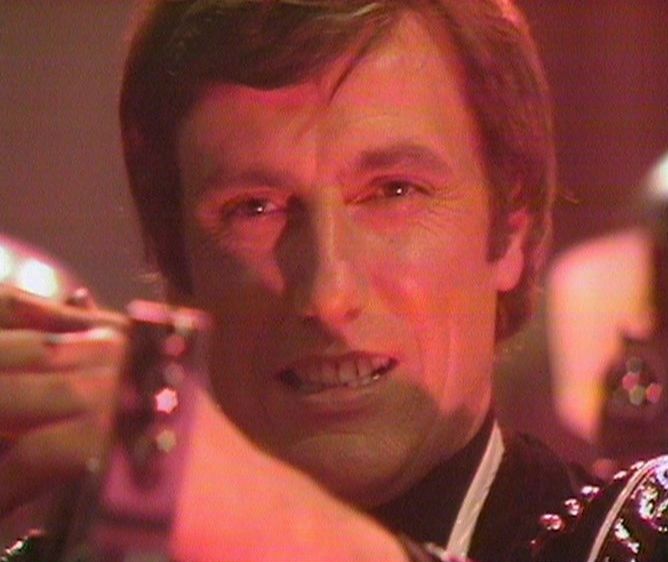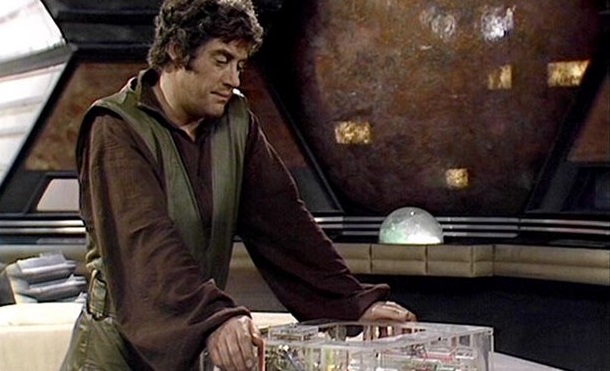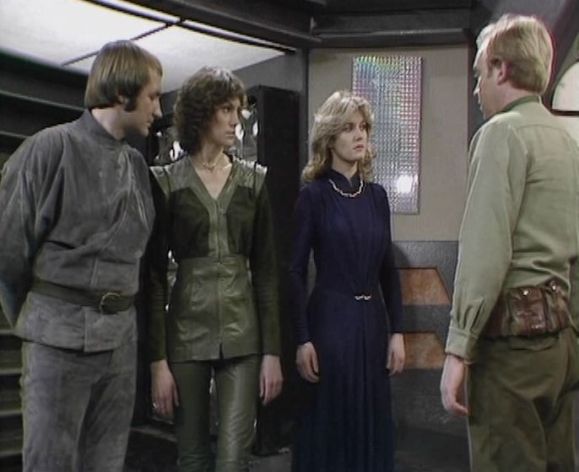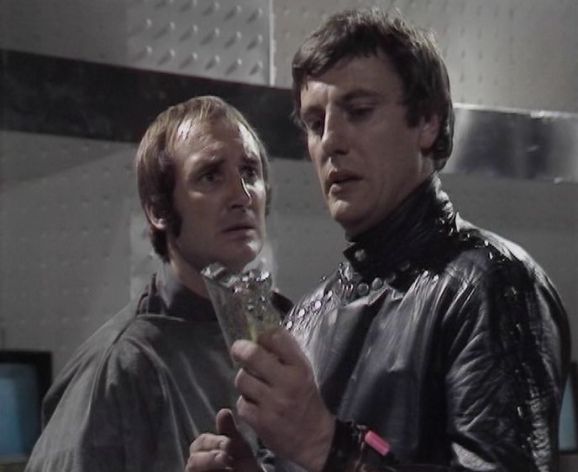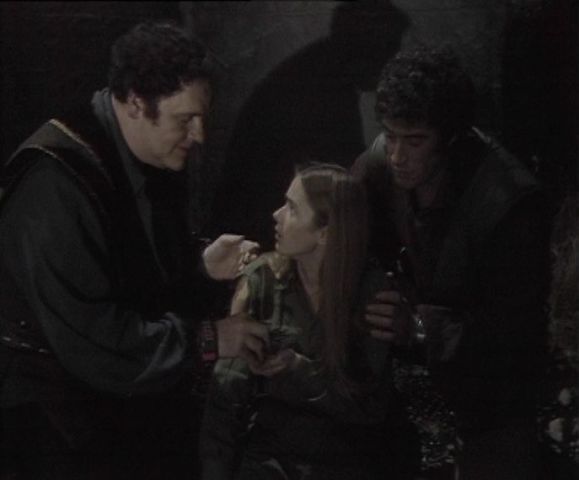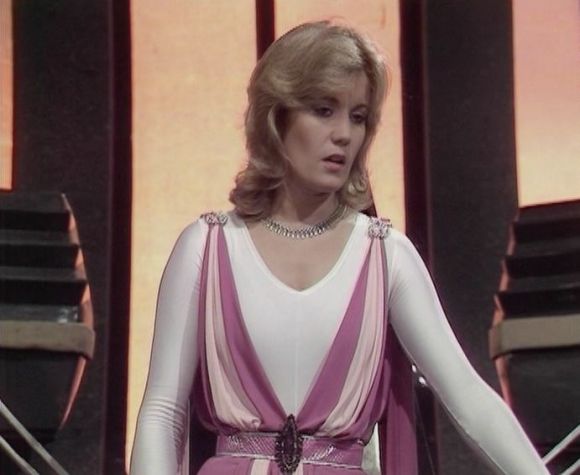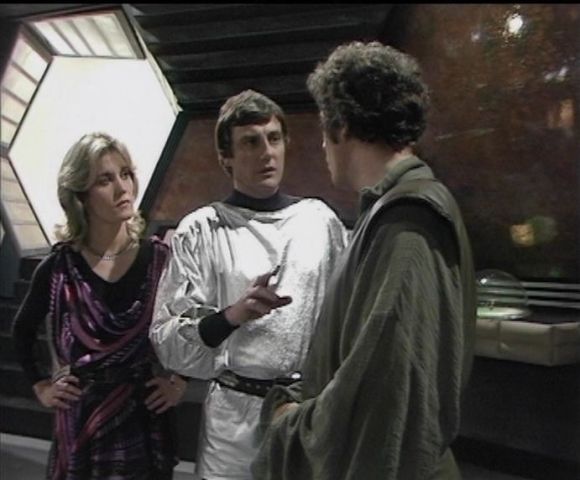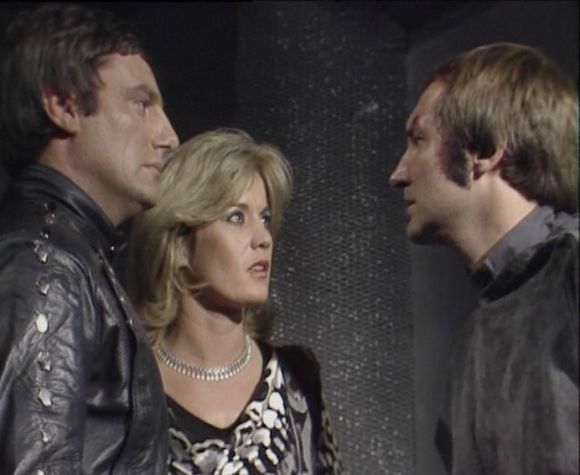
The planet Medusa is a world run by women where men are very much second-class citizens, only fit for menial domestic tasks (as well as pleasuring their mistresses of course). But after Medusa is blown out of its solar system (don’t ask) and drifts close to Earth, two worms, Adam (Pierre Brice) and Shem (Gareth Thomas), decide to turn. They steal a space-yacht and head for our world – a paradise where men are free to be men.
Star Maidens is a bizarre British/German co-production from the mid seventies. It’s been suggested that the series’ odd tone was a consequence of cultural differences – the Germans wanted to create a sex comedy whilst the British were more interested in crafting serious(ish) science fiction. These two different styles meet head on, with varying degrees of success …..
The fact that Star Maidens wasn’t networked indicates that ITV had little love for it. The show limped out at different days and times from region to region (a Sunday afternoon slot on Granada, a 5:15 pm weekday slot on both HTV and Anglia, etc) whilst some areas don’t appear to have shown it at all.
It certainly didn’t lack for talent though, both in-front of and behind the camera. It was created by Eric Paice, co-writer of the Pathfinders series with Malcolm Hulke (which had been a clear influence on the creation of Doctor Who). Several Doctor Who writers – Ian Stuart Black and John Lucarotti – contributed scripts whilst Freddie Francis, a respected director and cinematographer, directed five episodes. Another notable behind-the-scenes name lending his expertise to the series was Alan Hume, who worked as the director of photography on a score of major films (including multiple James Bonds and Return of the Jedi).

Three years before playing Roj Blake, Gareth Thomas had his first taste of the weird world of television science-fiction when he played Shem. Shem’s a rather subservient character, as not only is he in thrall to his female mistresses but he also plays second fiddle to Adam, who’s clearly marked as the alpha-male right from the start. In the first episode Shem is given several lines (“it’s a woman’s world”, “men’s liberation”) which hammers the point home that Medusa is a planet totally dominated by women. Subtlety is not a hallmark of this series.
French-born Pierre Brice might have been an unknown quantity for British audiences, but since he was a big star in Germany at the time it explains why he was drafted in to take one of the leading male roles. Adam’s decision to flee to Earth annoys his mistress Fulvia (Judy Geeson) whilst security chief Octavia (Christine Kruger) vows to get them back by any means necessary.
The Medusans kidnap two Earth scientists, Rudi (Christian Quadfleig) and Liz (Lisa Harrow), and as might be expected there’s a certain amount of irony and comedy to be mined out of their situation. Both are taken back to Medusa and suffer different fates – Rudi is assigned to a work-party whilst Liz is treated like a princess.
The guest casts feature familiar players such as Graham Crowden, Terence Alexander, Anna Carteret, Ronald Fraser and Alfie Bass. Those who enjoy picking out background faces might spot David Ellison playing a policeman (a few years later, along with Anna Carteret, he’d be a regular in Juliet Bravo) whilst any fans of Delta and the Bannermen may want to look out for Belinda Mayne in episode seven, Test for Love.
The first episode – Escape to Paradise – sets up the premise of the series with a very hard info-dump during the opening few minutes. This explains that Medusa (Space 1999 like) has somehow gained the ability to drift around the universe, eventually ending up not too far from Earth. There’s some nice modelwork on show, although unfortunately the models do rather look like models. That’s something of a hallmark of the series.

The next episode, Nemesis, sees Adam and Shem, newly arrived on Earth, forced to go on the run (it features the immortal line “there are two funny men stealing our apples”!). Following that, we have another Earth-based instalment, The Nightmare Cannon, notable for the eponymous device which causes the faces of Octavia and Fulvia to be seen by Adam and Shem everywhere. The moment when two suits of armour come lumbering towards Shem and raise their visors to display the features of Octavia and Fulvia (a not terribly convincing optical effect) is just one of many classic moments scattered thoughtout the series. Gareth Thomas certainly gives his all during this scene.
Terence Alexander has a good guest role in the fifth episode, Kidnap – he plays a smoothie with designs on Fulvia. Gregori (Alexander) plies Fulvia with champagne as a prelude to strapping her into a human thought transference machine. Alexander plays drunk amusingly, whilst decent actors like Philip Stone and Stanley Lebor lurk in a menacing manner.
One of the interesting things about the series is the fact that it features stories set both on Earth (featuring the misadventures of Adam, Shem and Fulvia) as well as Medusa (where Rudi and Liz find themselves to be fishes out of water). By centering the action around newcomers to both civilizations, there’s scope for drama and humour as they all come to terms with a new world which differs dramatically from their own. Although it’s something of a weakness that the first half of the series is dominated by Earth stories (a bit more variety at this point would have been welcome).
Test for Love finds us back on Medusa with Liz facing a terrible ordeal – she has to undergo a computer test in order to establish whether her claims that she doesn’t find Medusan men attractive is true (this mainly involves watching bare-chested men on a viewing screen). Lisa Harrow, who during her career has tackled many major roles at the RSC, admirably manages to keep a straight face. Quite what the lunchtime and early evening audiences made of this back in the seventies is anyone’s guess ….

The Perfect Couple is a series highlight. Adam and Fulvia, still stranded on Earth, decide to set up home together. But things don’t go smoothly as Fulvia becomes annoyed that househusband Adam’s coffee mornings are spent entertaining attractive housewives! Meanwhile, Fulvia’s story of life on Medusa has inspired the local women to rise up and take control. Today suburbia, tomorrow the world. Although it’s as unsubtle as the rest of the series, this one is genuinely funny (as well as featuring a nice guest-turn from Ronald Fraser).
Gareth Thomas gets a chance to shine in Hideout. Shem, like Adam, is still on the Earth and remains a hunted fugitive. He’s befriended by Rose (Conny Collins) but with the police closing in there’s danger all around. Thomas and Collins both work well and even though they don’t spend a great deal of time together, their relationship still feels real.
The second half of the series concentrates more on Medusan stories, with both The End of Time and Creatures of the Mind being of particular interest. In The End of Time, Earth scientist Professor Evans (Derek Farr – a strong presence throughout the series) is brought to Medusa by Octavia, but they arrive to find a city in crisis with the President (Dawn Addams) apparently dead. There’s an eerie tone to this one, which contrasts well with some of the broad comedy seen elsewhere.
Creatures of the Mind finds Liz under attack from a group of whispering robots. Scripted by Ian Stuart Black, it puts Lisa Harrow centre-stage and gives her some good material to work with. It’s just a pity that the twenty five minute format results in everything feeling a little rushed (although since the thought of some of the slighter episodes bulked out to fifty minutes is a terrifying one, maybe the shorter running time was the best option overall).
The series finale, The Enemy, sees Adam eventually make his way back to Medusa, which means he’s on hand to save the day as the planet comes under attack from a mysterious alien craft. This feat even impresses the hard-bitten Octavia (although how long she stayed impressed we’ll never know, as it was decided not to renew the show for a second series).

Originally released by Delta in 2005 but OOP for several years, Star Maidens has now been brought back into print by Simply. Simply’s release looks to be pretty much the same as Delta’s, with identical menu screens and picture quality. The PQ is reasonable, athough had new prints been struck from the negatives then things could have looked a good deal better. But apart from the expense, that supposes the original negatives still exist – which due to the age of the series isn’t certain.
There’s a bonus feature on disc two – an interview with Gareth Thomas. Running for 35 minutes, it offers a highly entertaining trot through the series, as well as briefly touching on other parts of his career. Thomas was always an affable and unpretentious interviewee, which becomes clear over the course of this feature. It’s easy to imagine that many actors would be reluctant to revisit such an undistinguished and faintly embarrassing part of their career, but Thomas had no such qualms and was happy to speak at length about the production.
There isn’t another series like Star Maidens. It’s fusion of gender politics, mild titillation (the eye-catching female guards, decked out in hotpants and crop tops) and sci-fi themes all combine to produce a heady brew. And although it’s no classic, it possesses a certain wonky charm (even if there are times when it’s impossible not to react with slack-jawed incredulity at the events unfolding on the screen).
Hand on heart, some of the acting isn’t great, the music is of its time (that’s the kindest thing I can say about it) and the extensive redubbing tends to increase the unreal air of the stories. But I still find it a fascinating and entertaining time capsule of the period and whilst it won’t be to everybody’s tastes, I’m glad that it’s available once again.
Star Maidens is released by Simply Media on the 17th of April 2017. The series is comprised of thirteen 25 minute episodes and has an RRP of £19.99.



